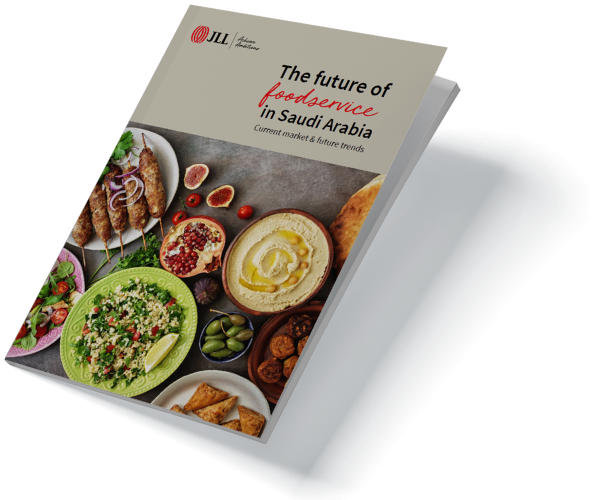The Saudi Arabian General Authority for Investment (SAGIA) forecasts that spending on food service will grow by 6% per annum over the next five years. The Saudi F&B industry accounted for 10% of gross domestic product (GDP) in 2018 according to the report, which also highlights the importance of the industry to the overall economy. Produced in June 2020, JLL's report examines the food and beverage trends that are set to lead the way in The Kingdom of Saudi Arabia. Download your copy of the report today

Foreword
Saudi Arabia’s Evolving Food & Beverage Industry
At the time of data collection and analysis, our region had not yet experienced the social and economic consequences of the outbreak of COVID-19. While the F&B landscape is expected to change, with restaurants facing cash-flow and operational restrictions, we remain positive in our outlook for the industry’s growth and the shift in trends. Saudi Arabia’s Food and Beverage (F&B) industry is the largest in the Middle East, valued at USD 45 billion. The Saudi Arabian General Authority for Investment (SAGIA) forecasts that spending on food service will grow by 6% per annum over the next five years (far ahead of the overall population growth of 1.8%), with food consumption reaching SAR 221 billion (USD 59 billion) by 2021. This growth is being driven by a number of demographic and social changes sweeping the Kingdom.
Large, young population, with high disposable incomes
Rapidly changing demographics present many opportunities for developing the Food & Beverage industry in Saudi Arabia. With a population approaching 34 million by the end of 2019 Saudi is the largest domestic F&B market in the GCC.
More relevant than the overall size of the population, is the relatively young age demographic with 53% between the ages of 15-44. This age group has a higher propensity to spend on F&B, and is more open and exposed to the changing consumer trends being experienced globally.
Expansion of the tourism and entertainment industries
The tourism industry in Saudi Arabia is changing drastically, with public and private sector efforts focused on diversifying the tourist base and purpose of travel to the
Kingdom (away from business and religious tourism). In the long run, this is expected to result in a significant shift in the Kingdom’s retail and F&B landscape as part of the government’s modernization and economic diversification efforts. Planned investments in the entertainment sector will also have a major impact on the quality and diversity of F&B concepts in the Kingdom. Vision 2030 envisages that household spending on domestic entertainment will increase from 2.9% of total expenditure in 2015 to 6% by 2030. The expansion of the cinema industry alone is expected to create opportunities for supporting retail and F&B offerings.
The planned increase in the number and size of sporting events and concerts will also have positive implications for the foodservice sector. This is already resulting in a proliferation of mobile food and beverages businesses and food trucks.
This growth will not just be limited to the major cities of Riyadh and Jeddah. Al Ula in the North West of the Kingdom (and home to Saudi’s first UNESCO World Heritage site) introduced a number of concerts and musical performances under the banner of ‘Winter at Tantora’ in 2019. This event was catered for by a wide range of temporary food trucks and the establishment of a number of fine dining pop up restaurants (including Anabelle’s, Sass Café, and La Cantine).
What we have seen
In line with global trends, the F&B market in Saudi Arabia has already seen many changes and developments:
- A number of world-famous fine dining restaurants have tested the market by opening their first pop-up branches in Saudi Arabia as part of the recent Jeddah and Riyadh Seasons (e.g. Zuma, Scalini, and Catch).
- A variety of international casual and fine dining options have entered the Riyadh market (e.g. Cheesecake Factory, Hakkasan and Cipriani).
- Michelin star level restaurants are opening permanently across the Kingdom (e.g: Rasoy, an Indian restaurant in Jeddah).
- There has been a trend towards new specialty smoke houses in Jeddah and elsewhere (e.g. The Warehouse, Chefs and The Smoke House).
- More specialty third-wave coffee shops are opening across the main cities. These are proving popular locations for friends to gather and socialize, especially among Millennials and Generation Z (e.g. C-Hub, Overdose, Dose, Toga).
- Increasing number of famous local Saudi chefs opening their own restaurants (e.g. Nehal Felemban) or leasing space to give culinary lessons (e.g. Bakery M).
The first Culinary Arts Academies are planned to open in Jeddah and Riyadh. - The growing trend of food banks (e.g. Etaam), reflecting people’s awareness & responsibility in preserving food, with wedding and banquet halls now obliged to subscribe to food banks and minimize food waste. It is estimated the Etaam food bank preserved around 2.1 million meals in 2019.
Link to download:
Download